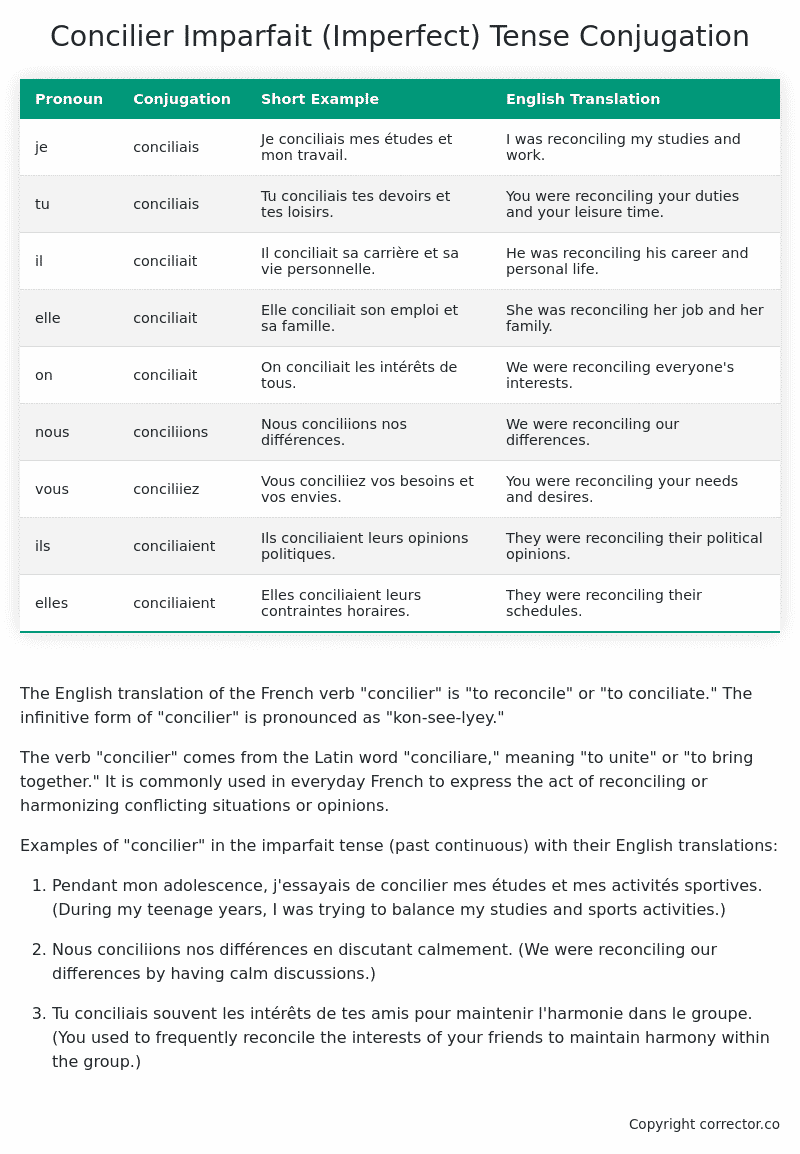Imparfait (Imperfect) Tense Conjugation of the French Verb concilier
Introduction to the verb concilier
The English translation of the French verb “concilier” is “to reconcile” or “to conciliate.” The infinitive form of “concilier” is pronounced as “kon-see-lyey.”
The verb “concilier” comes from the Latin word “conciliare,” meaning “to unite” or “to bring together.” It is commonly used in everyday French to express the act of reconciling or harmonizing conflicting situations or opinions.
Examples of “concilier” in the imparfait tense (past continuous) with their English translations:
-
Pendant mon adolescence, j’essayais de concilier mes études et mes activités sportives.
(During my teenage years, I was trying to balance my studies and sports activities.) -
Nous conciliions nos différences en discutant calmement.
(We were reconciling our differences by having calm discussions.) -
Tu conciliais souvent les intérêts de tes amis pour maintenir l’harmonie dans le groupe.
(You used to frequently reconcile the interests of your friends to maintain harmony within the group.)
Table of the Imparfait (Imperfect) Tense Conjugation of concilier
| Pronoun | Conjugation | Short Example | English Translation |
|---|---|---|---|
| je | conciliais | Je conciliais mes études et mon travail. | I was reconciling my studies and work. |
| tu | conciliais | Tu conciliais tes devoirs et tes loisirs. | You were reconciling your duties and your leisure time. |
| il | conciliait | Il conciliait sa carrière et sa vie personnelle. | He was reconciling his career and personal life. |
| elle | conciliait | Elle conciliait son emploi et sa famille. | She was reconciling her job and her family. |
| on | conciliait | On conciliait les intérêts de tous. | We were reconciling everyone’s interests. |
| nous | conciliions | Nous conciliions nos différences. | We were reconciling our differences. |
| vous | conciliiez | Vous conciliiez vos besoins et vos envies. | You were reconciling your needs and desires. |
| ils | conciliaient | Ils conciliaient leurs opinions politiques. | They were reconciling their political opinions. |
| elles | conciliaient | Elles conciliaient leurs contraintes horaires. | They were reconciling their schedules. |
Other Conjugations for Concilier.
Le Present (Present Tense) Conjugation of the French Verb concilier
Imparfait (Imperfect) Tense Conjugation of the French Verb concilier (You’re reading it right now!)
Passé Simple (Simple Past) Tense Conjugation of the French Verb concilier
Passé Composé (Present Perfect) Tense Conjugation of the French Verb concilier
Futur Simple (Simple Future) Tense Conjugation of the French Verb concilier
Futur Proche (Near Future) Tense Conjugation of the French Verb concilier
Plus-que-parfait (Pluperfect) Tense Conjugation of the French Verb concilier
Passé Antérieur (Past Anterior) Tense Conjugation of the French Verb concilier
Futur Antérieur (Future Anterior) Tense Conjugation of the French Verb concilier
Subjonctif Présent (Subjunctive Present) Tense Conjugation of the French Verb concilier
Subjonctif Passé (Subjunctive Past) Tense Conjugation of the French Verb concilier
Subjonctif Imparfait (Subjunctive Imperfect) Tense Conjugation of the French Verb concilier
Subjonctif Plus-que-parfait (Subjunctive Pluperfect) Tense Conjugation of the French Verb concilier
Conditionnel Présent (Conditional Present) Tense Conjugation of the French Verb concilier
Conditionnel Passé (Conditional Past) Tense Conjugation of the French Verb concilier
Conditionnel Passé II (Conditional Past II) Tense Conjugation of the French Verb concilier
L’impératif Présent (Imperative Present) Tense Conjugation of the French Verb concilier
L’impératif Passé (Imperative Past) Tense Conjugation of the French Verb concilier
L’infinitif Présent (Infinitive Present) Tense Conjugation of the French Verb concilier
L’infinitif Passé (Infinitive Past) Tense Conjugation of the French Verb concilier
Le Participe Présent (Present Participle) Tense Conjugation of the French Verb concilier
Le Participe Passé (Past Participle) Tense Conjugation of the French Verb concilier
Struggling with French verbs or the language in general? Why not use our free French Grammar Checker – no registration required!
Get a FREE Download Study Sheet of this Conjugation 🔥
Simply right click the image below, click “save image” and get your free reference for the concilier imparfait tense conjugation!

Concilier – About the French Imparfait Tense
NOTE: To take a deep dive into all the French tenses then see our article on Mastering French Tense Conjugation.
Formation of the Imparfait Tense
For regular -er verbs:
For regular -ir verbs
For regular -re verbs
Common Everyday Usage Patterns
Description of Past Habits
Background Information
Mental and Emotional States
It’s employed to express emotions, thoughts, or physical sensations in the past. For example: “J’étais content quand il est arrivé.” (I was happy when he arrived.)
Ongoing Actions
Points to Note About the Imparfait Tense
Passé Composé vs. Imparfait
Conditional
Si Clauses
Narration
I hope you enjoyed this article on the verb concilier. Still in a learning mood? Check out another TOTALLY random French verb imparfait conjugation!


